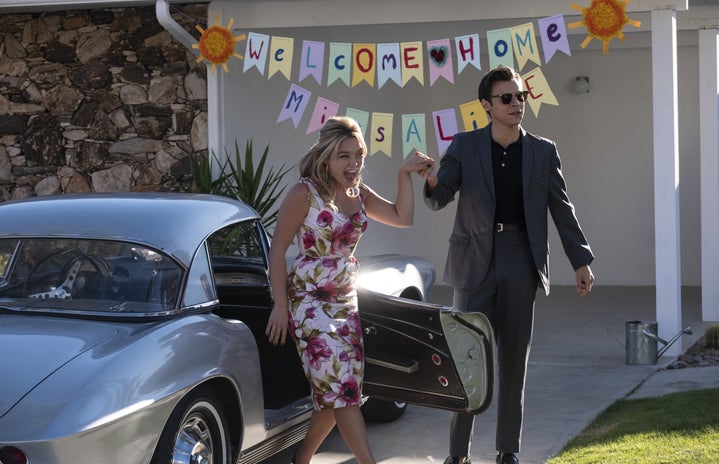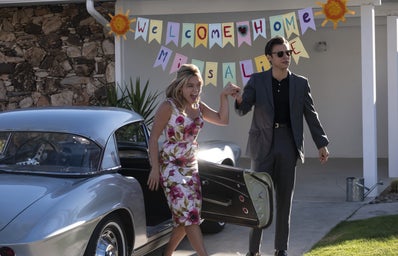Warning: This review contains spoilers for the film Don’t Worry Darling.
Moviegoers would be hard-pressed to find a more talked-about movie in recent memory than Olivia Wilde’s Don’t Worry Darling. Even months prior to its release, it was generating headline after headline – all centered around the numerous scandals said to have taken place between the cast and crew. Rumors of a falling out between Wilde and the movie’s lead, Florence Pugh, conflicting stories about Shia LeBeouf’s involvement and departure from the project, and even a bizarre video where Harry Styles appears to spit on fellow cast member Chris Pine at the Venice Film Festival all cemented the film as a gossip mill. And now, since the film’s announcement more than three years ago, it’s finally here.
Don’t Worry Darling has the setup for a great film – a star-studded cast with a beautifully designed production and a script that made the cut for the 2019 Hollywood Black List, consisting of Hollywood’s best unproduced screenplays. It opens well, establishing a small town of mid-century modern homes in the middle of the California desert, sometime in the 1950s. This town, Victory, is inhabited by a cast of colorful characters: Bunny, a gossip-loving mother of two (played by director Olivia Wilde), Gigi (Dita Von Teese) who is curious if not ditzy, Margaret (KiKi Layne) who is cast out by the other wives due to her mental unwellness, and their largely unremarkable husbands. At the center of this story is Alice, a young, devoted housewife played by the remarkable Florence Pugh, and her husband Jack Chambers, played by popstar Harry Styles.
Every morning, the men leave the town in their cars to work on the top-secret “Victory Project.” The women, asked to stay in town at all times and for “discretion above all else,” gossip, shop, and perform household chores, serving as perfect mid-century housewives. Alice cooks, cleans, and polishes while Jack is away, all while humming a song she cannot remember. Victory is headed by Frank (Chris Pine), a mysterious and captivating figure who has the whole town in awe, along with his wife, Shelley (Gemma Chan, although the part originally belonged to Dakota Johnson). After witnessing a plane crash in the desert, Alice defies the rules by leaving town to help. In doing so, she comes across Victory Headquarters. She touches her hands to the mirror-like windows and experiences bizarre hallucinations before waking back in her home.
Alice continues to experience surreal and increasingly frightening hallucinations, which come to a head when she sees Margaret slit her own throat and fall from the roof of her home. Alice rushes to help her but is stopped by men in red jumpsuits. From the moment her hysteria begins, Alice is relentlessly gaslit by all those around her: Jack, Frank and even her best friend Bunny, who accuses Alice of selfishness against Jack. After a disaster of a dinner party where Alice attempts to confront Frank, she convinces Jack to flee Victory with her – but he betrays her, and she is dragged away by the men in jumpsuits. They strap Alice down and perform electroshock therapy, where we see intercut visions of the modern world, where Alice Warren is an esteemed surgeon in a tense relationship with Jack, unemployed and now sporting greasy hair and an unshaven face.
Alice returns to her home in Victory, cured of her hysteria and once again the ideal, submissive housewife. When she hears Jack humming the tune that has haunted her since her visions began, she has another, more complete vision; where Jack has kidnapped her and keeps her in a comatose state in his bed, forcing her to live in a simulation of Frank’s creation so they can be together. She confronts him and he defends himself and begs her forgiveness. During the altercation, Alice kills him in self-defense. Bunny finds Alice covered in blood and reveals that she knew Victory was fake, and that she chooses to stay because in the real world, her children are dead. Bunny warns Alice to flee to headquarters, where there is a portal back to the real world, and holds off her own husband from stopping her. Hearing of Jack’s death, Frank orders his men to capture Alice right before he is stabbed and killed by his wife, Shelley. Alice makes a daring escape to Victory headquarters and, as before, places her hands against the glass with the men pursuing her only moments behind. We cut to black as we hear her gasp for air, awake and free.
It can be said that the only thing more jumbled and confused than Alice herself is the film’s pacing, which takes nearly half the movie to find its footing, and those familiar with the psychological-thriller genre may find themselves figuring out the twist before the film is even halfway over. The buildup is uneasy and uncertain, coming to a head in the third act, which is also, uncoincidentally, where the film really starts to fall apart. Olivia Wilde brings back writer Katie Silberman from her directorial debut Booksmart, who was charged with the task of reworking the script. Where the writing is weakest, it is somewhat remedied by the stellar production design (Katie Byron) and costume design (Arianne Phillips), and by the lively cinematography by Matthew Libatique (Black Swan, A Star is Born). The editing choices are often abrupt and disorienting, but in the end, it can be said that this contributed to the overall themes.
There are several issues with the story, most of them within the last half hour of the film. Shelley killing Frank (and whispering a vague and unmotivated “It’s my turn now.”) is a choice that feels neither timely nor justified, but more of an attempt to secure a “triumphant ending” in a genre that doesn’t call for such a thing. While Don’t Worry Darling could have benefitted from a tighter script, it chooses style over substance, but is thoroughly enjoyable throughout the entirety of its two-hour runtime.
Predictably, Florence Pugh gives the best performance. Even if not as dimensional as previous performances, such as her standout role in Ari Aster’s Midsommar (2019), she is present, believable, and intriguing to watch. Chris Pine is a close runner-up, complimenting her through his performance as Frank, a perfect concoction of suave and menace. The film is worth seeing for their performances alone. The supporting cast play their roles with efficiency, if not much else.
Casting global superstar Harry Styles was perhaps the film’s biggest mistake. His performance falls flat to say the least; more than dreadful, but far less than stellar. His inexperience as an actor is apparent, especially in the presence of Pugh and Pine, who gave the standout performances of the film. Fortunately, his time on screen and the weight of his role is small enough to prevent him from damaging the film entirely. But besides his shortcomings as an actor, his casting in the role of Jack is a blunder that comes at the cost of the movie’s twist. He lacks the ability to meld into the character – he is unmistakably Harry Styles the entire time. And the result of casting an iconic heartthrob to play Jack is a less shocking, less believable, and much less powerful twist. It results in an audience that finds the reveal humorous rather than horrifying and who are far too eager to forgive Jack.
Wilde holds her own as both director and actor. Although, in her attempt to avoid common clichés in the genre, audiences are left in the dark at times, searching for nonexistent connections between neglected plot points. Still, the film ends fairly neatly; the world and characters are captivating enough for the faults to be forgivable. Is Don’t Worry Darling all bad? No. The harsh reviews following its debut at the Venice Film Festival feel largely unjustifiable, almost certainly tainted by the drama surrounding the film’s press tour. It’s a solid addition to Wilde’s repertoire in design and execution, although her reference to the film as being about “female pleasure” is misleading in a way that is either idiocy or genius. Still, as a story of female autonomy, and as a thriller with bizarre occurrences and the visuals to match, it is most definitely worth seeing.


